M8U1 Word power & Grammar and usage (T)
- 格式:doc
- 大小:52.50 KB
- 文档页数:9
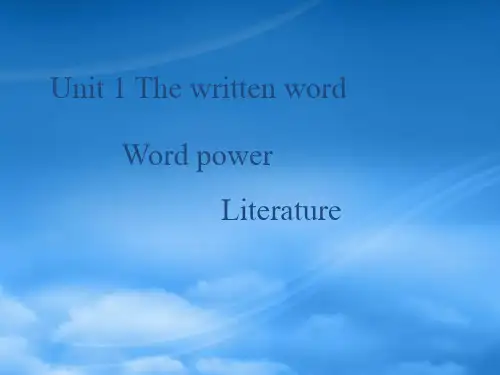
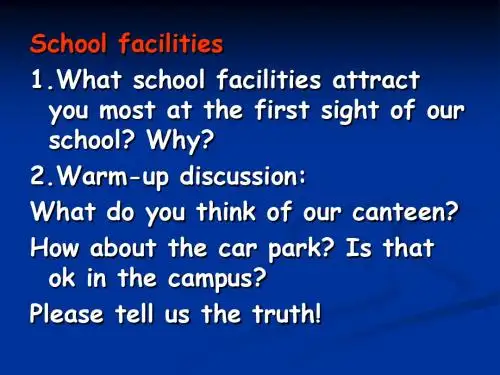
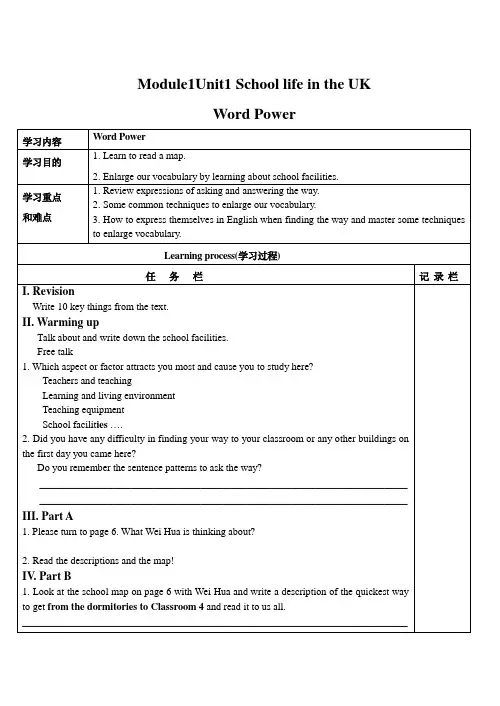
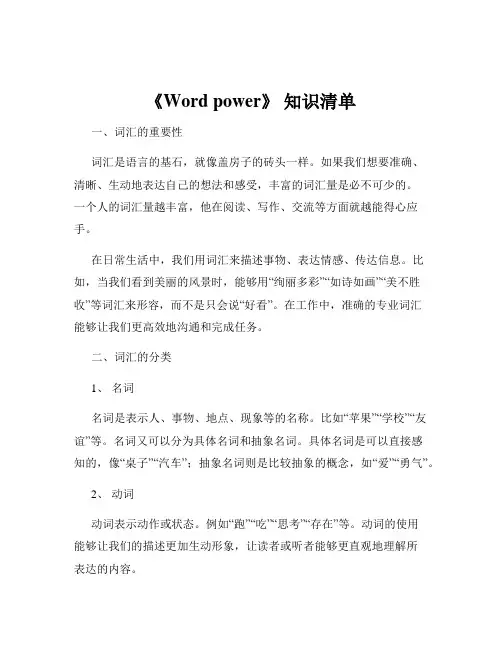
《Word power》知识清单一、词汇的重要性词汇是语言的基石,就像盖房子的砖头一样。
如果我们想要准确、清晰、生动地表达自己的想法和感受,丰富的词汇量是必不可少的。
一个人的词汇量越丰富,他在阅读、写作、交流等方面就越能得心应手。
在日常生活中,我们用词汇来描述事物、表达情感、传达信息。
比如,当我们看到美丽的风景时,能够用“绚丽多彩”“如诗如画”“美不胜收”等词汇来形容,而不是只会说“好看”。
在工作中,准确的专业词汇能够让我们更高效地沟通和完成任务。
二、词汇的分类1、名词名词是表示人、事物、地点、现象等的名称。
比如“苹果”“学校”“友谊”等。
名词又可以分为具体名词和抽象名词。
具体名词是可以直接感知的,像“桌子”“汽车”;抽象名词则是比较抽象的概念,如“爱”“勇气”。
2、动词动词表示动作或状态。
例如“跑”“吃”“思考”“存在”等。
动词的使用能够让我们的描述更加生动形象,让读者或听者能够更直观地理解所表达的内容。
形容词用于描述或修饰名词,赋予名词更多的特征和属性。
比如“美丽的花”“聪明的孩子”“高大的建筑”。
4、副词副词通常用来修饰动词、形容词或其他副词,以表示程度、方式、时间、地点等。
像“很快地跑”“非常漂亮”“经常去”。
5、介词介词用于表示名词、代词等与其他词的关系。
常见的介词有“在……上面”“在……里面”“在……之后”等。
6、连词连词用于连接单词、短语或句子,使语言表达更加连贯和流畅。
比如“和”“但是”“因为”。
7、代词代词是用来代替名词或名词短语的词。
如“我”“你”“他”“这”“那”等。
三、词汇的积累方法1、阅读广泛阅读各种类型的书籍、报纸、杂志等,是积累词汇的有效途径。
在阅读过程中,我们会遇到各种各样的词汇,通过上下文的理解,可以更好地掌握它们的含义和用法。
可以选择一些经典的文章、诗词或者词汇表进行背诵。
背诵能够加深对词汇的记忆,同时也有助于培养语感。
3、写作通过写作来运用所学的词汇,不仅能够巩固记忆,还能发现自己在词汇使用上的不足之处,从而有针对性地进行补充和改进。
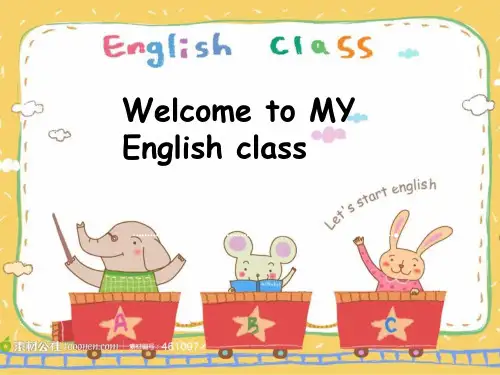
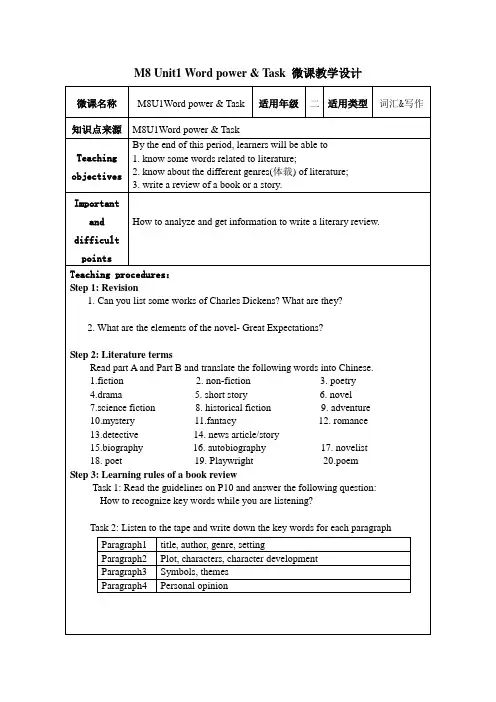
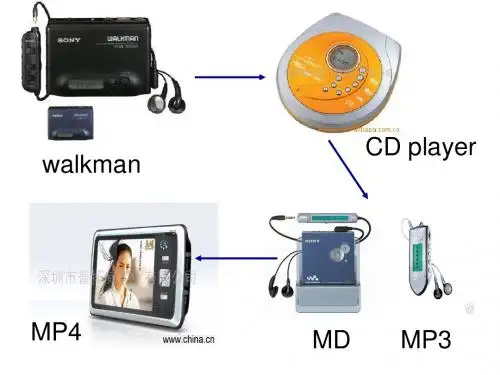
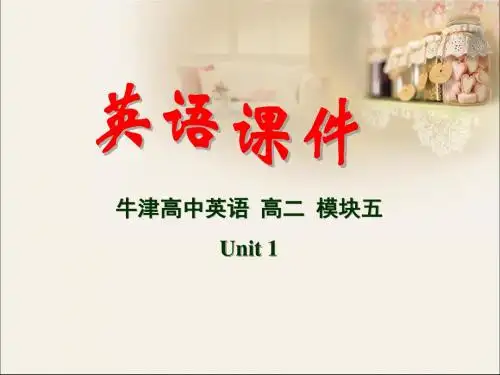

Module 8 Unit1 The written word (1)重点单词和用法1. characteristic adj.典型的/特有的be ~ of = be ______ of 为…所特有Ma Po tofu is ~ of Sichuan food.n.人或事物的特征、特点、特色(并非性格)character n.个性、性格;人物或角色;文字,字符,字号;(U)特点,特征,特色in character/out of character符合/不符合...的个性He is firm in character. 他性格坚强。
2. abuse vt.1)滥用=misuse The mayor abused power while in office. 2)被虐待的孩子the _________ children3)辱骂=insult He is always abusing and offending people. 他经常辱骂和冒犯他人。
n. drug /alcohol abuse 毒品的滥用/酗酒abusive a. 谩骂的/虐待的abusive language3. desperate adj. (more~, most ~) desperation n. 拼命地in desperation =______________1)不顾一切的,拼命的,绝望的(定/表语) They made a desperate effort/attempt to rescue the child.2)(作表语的)极渴望的,极需要的be desperate for/to do__________(suffer) from the war for too long, Syrians _______________________________.(渴望和平)3)(局势)危急的,严峻的in desperate need of face a desperate shortage of water4. tension n. 1) 紧张,紧张气氛2) 矛盾,对立_________________缓解紧张tremble _____ tensiontense adj. = nervous 紧张的气氛tense atmosphere She lay there, eyes shut, body tense.5. generous adj.①慷慨的,大方的be generous/mean ________ sb/_______ sth 对某人/某物大方②宽厚的,仁慈的be generous to ...= show ___________ toward one’s enemyShe is g to help others and sets an example for us.6.vain adj. 1)爱虚荣的,自负的be ~ about/of She is about her beauty. as vain as a peacock2)(作定语的)(结果)徒劳的,无结果的a vain attempt/ effort make a vain promisein vain=vainly徒劳He tried in vain to memorize the poem. =He tried to memorize the poem, but _________.7.bent adj. 1)弯曲的;驼背的a bent stick be bent with age 2)不诚实的,贪赃枉法的a bent accountantbe bent on sth / doing sth 一心想要;决心要(通常指坏事) He seems _________ making life difficult for me. _______________a musician(一心想要当音乐家),Jim spent at least ten hours practicing playing the piano.n.天赋,爱好=gift/talent He has a natural ~ for football. musical/literary talent决心要做be determined to do sth (表示状态) make up one’s mind / determine to do sth (表示动作) determine sb to do sth使…下决心做某事decide on/upon决定某事_____ to train his daughter in English, he put an ad in the paper,“---an English teacher for a ten-year-old girl.”A. Determined; WantedB. Determined; WantingC. Determine; WantedD. Determining ;Wanting8.on the run 1)忙个不停Mom has been on the run all week , _____________(prepare) for Tom's wedding.2)在逃We've got the enemy on the run.in the long/short run/term从长远来看on the move在活动中,进行中9. live up to达到,符合(期望)live ________ one’s fame/reputation/expectations/promise/principleslive 1)以…为主食feed on 2)靠…生活3)继续活着The memory of his first love lived on in his mind.联想:live through live with=put up with/bear/stand/tolerate 比较:live alive living lively10. reform v. 1)改革,改善2)改过自新It is important to ________ criminals than (to) punish them.n.改革,改善the policy of reform and opening up carry out/call for /demand the educational reforms11. bind ( bound, bound) ①捆绑,系= tie bind sb/sth (to sth) ②(使)联合③约束;迫使bind/tie sb hand and foot捆绑住手脚;用条条框框限制某人bound adj.①被捆绑的,受约束的;有义务的”,He had been bound to secrecy他被迫保守秘密。
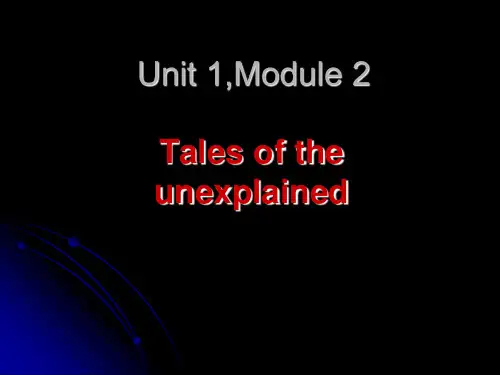
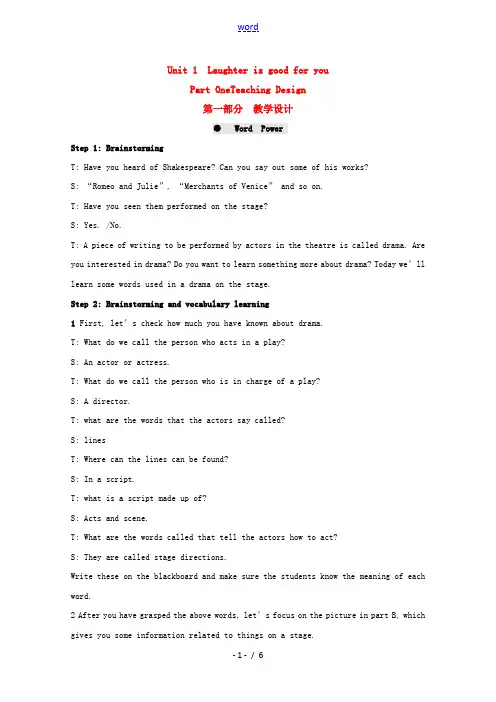
Unit 1 Laughter is good for youPart OneTeaching Design第一部分教学设计● Word PowerStep 1: BrainstormingT: Have you heard of Shakespeare? Can you say out some of his works?S: “Romeo and Julie”, “Merchants of Venice” and so on.T: Have you seen them performed on the stage?S: Yes. /No.T: A piece of writing to be performed by actors in the theatre is called drama. Are you interested in drama? Do you want to learn something more about drama? Today we’ll learn some words used in a drama on the stage.Step 2: Brainstorming and vocabulary learning1 First, let’s check how much you have known about drama.T: What do we call the person who acts in a play?S: An actor or actress.T: What do we call the person who is in charge of a play?S: A director.T: what are the words that the actors say called?S: linesT: Where can the lines can be found?S: In a script.T: what is a script made up of?S: Acts and scene.T: What are the words called that tell the actors how to act?S: They are called stage directions.Write these on the blackboard and make sure the students know the meaning of each word.2 After you have grasped the above words, let’s focus on the picture in part B, which gives you some information related to things on a stage.3 Let’s focus on the passage in part C, which checks your s’ability of understanding and using the words you have just learnt. In order to fill in the blanks correctly, you have to understand the passage and the exact meaning of the missing words. You should first plete the exercises individually and then check answers with the class. Answers1 actor2 director3 lines4 cast5 script6 stage7 acts 8 scenes 9 costume 10 wings 11 props 12 light13 scenery 14 stage directionsStep 3: Vocabulary extension1Boys and girls, let’s suppose you are going to perform a drama at the school art festival. Discuss in your group: How you are going to prepare and arrange for the performance. The following words can help you.A dramacast directors, actors, actressesscript theme, lines, stage direction,acts/scenesstage wings, microphone, curtains, lights,scenery, setothers Budge, props, costumes2 Let’s e to part D. We know in English, there are many useful idioms and sayingabout laughing and it is good for us to keep some useful idioms in mind. This part will present some to us. Look at the idioms and the sentences below. Then see if you can find any more idioms about smiling or laughing and write sentences using them in the space provided.Sample answersto have the last laugh: to make someone who has criticized or defeatedyou look stupid by succeeding in something more important or by seeingthem faile.g.They fired her last year, but she had the last laugh because she was taken on by their main rivals at twice the salary.He laughs best who laughs last.all smiles: being happy again especially after feeling sade.g.When Maryfound out about the holiday, she was all smiles.Step 4:Consolidation exercises.1 Write out the words according to the English explanations.1 make somebody laugh or simile ____________2 the person in charge of a play ____________3 very good of high quality ____________4 full of eagerness or interest ____________5 perform without preparation ____________6 take place, happen ____________7 worried or afraid ____________8 unlike anything else ____________9 text of a play, film, ____________10 instrument that changes sound waves into electrical current used in broadcastingspeech, music, etc. _____________AnswersII. ReadingWords: 333; time: 5’30”A night of funWednesday night 7:30 p.m. at the Chuckle Bar!Starring Rodney Mann, Pedro Mendez and Larry Dunne!Next Wednesday night at the Chuckle Bar we have an all-star line-up of edians. Three of the world’s best known edians are ing together for one night only. Book your tickets by calling 1-900-555-6565 or be at the door early to buy them before the show begins.Rodney MannMann is famous for his jokes about average people and their lives. Many of his jokes are social mentaries on everyday. He loves to set his jokes in New York, the city where he grew up.Mann’s most famous opening line, “You know, I was walking down the street the other day…’ is know all over the world. He is just back from his tour of Europe, and is appearing at the Chuckle Bar for one night only. Don’t miss out!Pedro MendezPedro Mendez grew up on a small farm in Panama. He moved to the USA with his parents when he was ten, and has been telling jokes and making people laugh ever since. Recently, the 30-year-old edian began filming a new TV programmer that he will both act in and produce.Experience Mendez’s unique Latin style humor for yourself. His “I had a farm in Panama” routine is a classic that should not be missed.Larry DunneLarry Dunne has been making people laugh all over the world for more than five decades. He began his career by performing for soldiers in Hawaii in the 1950s, and since then, he has been the host of his own late night TV programmer. The videos and DVDs of his performances are the best selling of any stand-up act out there. An old style edian, Dunne uses lots of singing and dancing as part of his routines.Dunne is best known for his jokes about life in the USA and how it has changed during his lifetime. This will be Dunne’s last show before he retires, so don’t miss it.Call 1-900-555-6565 to reserve your tickets or be at the door by 7:00 p.m.1 The edy show will have_______ edians on _______ night.A three; oneB three; twoC one; threeD one; two2 Rodney Mann grew up in ________.A the USAB PanamaC HawaiiD New York3 The show begins _______.A at lunch timeB at 7:30 p.m.C at 7:00 p.m.D at 7:30a.m.4 Pedro Mendez has lived in ______for _____ years.A the USA; thirty-fourB the USA; tenC Panama; thirty-fourD the USA; twenty5 The oldest edian is probably ________, and has been performing _______.A Rodney Mann; for over fifty yearsB Larry Dunne; since the 1970sC Larry Dunne; for over fifty yearsD Pedro Mendes; for over fifty yearsStep 5: Homework1 Parts B1and B2 on page101 of the Workbook.2 Prepare the Part Grammar and Usage。
Word powerStep 1: Brainstorming1. Guessing Game:At the beginning of today’s class, let’s play a guessing game. Here are several cards, each of which says a household appliance. I’d like one of you to give a brief description of the deviceFor referenceAn air-conditioner: It can be stationed on the wall. It can make our room warm in winter and cool in summer.A microwave oven: It’s a type of oven which cooks food very quickly using microwaves.A refrigerator: A cabinet or room in which food is kept cold.A washing machine: A electric machine for washing clothes.A digital computer: A device that makes calculations, etc with data represented as a series of digits.A vacuum cleaner: A electrical appliance that takes up dust, dirt, etc by suction.2. Next time you are in a shop, notice the electrical and electronic goods especially household appliances that are sold and try to list as many devices as possible.Step 2: Vocabulary learning1. A section manager from a big department store is showing the electrical andelectronic goods to a new salesperson. Please read what the manager says (Part Aon Page6). Pay special attention to the phrases in blue. Make sure that you understand what they actually mean.2. Now, please arrange the goods from the manager’s introduction in the correct section. Fill inElectronic goodsAudio devices: CD players MD players MP3 players Educational products: educational software electronic dictionaries electronic translatorsVideo devices: Video cameras Digital cameras Computers Mobile phones3. Let’s come to the household appliances section. Read the passage in Part B. Pay attention to the names of the goods in this section.4. Pair work: Give a brief description of the household appliances to your partner in your own words. You may also describe other household appliances you know.5. Now we’ve been familiar with the names of household appliances. Let’s try to complete the article in Part C on Page 7.AnswersC(1) electronic goods (2) household appliances (3) audio devices(4) CD players (5) MD players (6) MP3(7) video cameras (8) educational software (9) translators(10) freezer section (11) vacuum cleaners (12) microwave oven1.Of course, electrical appliances and electronic devices are useful in various ways in ourlives. But which do you think is the most useful? First, have a discussion in group of four about the questions.2.Now, present the result of your discussion.3. Let’s come to Part D on Page 7. Complete the table with as many as you can think of, placing the items in order of importance with the most important one first.4. Reading:words:337 time:5’10’’All in the mind: Scientific metaphorsIt is certainly true that computers, cell phones and digital cameras havebecome part of our everyday life. Anywhere we go, we can hear theringing of a cell phone, the tapping of a keyboard or the clicking of amouse. We are said to be living in the “Information Age”, a time of new discoveries and great changes. But is it really true that we are living in the “Information Age”? Has our life changed that much? Many of the things we do with computers, such as typing and sending mail, are things that we also did before. Has anything really changed except the tools we use?When we describe or talk about new inventions, we use words and ideas that we already know. For example, when we want to explain how a computer works, we use words like “memory”, “store” and “cut and paste”. The words are useful, but they are not quite true. A computer’s “memory” is similar to human memory in some ways, but it is also very different.A computer does keep information in its memory, but that is clearly different from other kinds of storage. We do cut and paste, but we don’t use scissors or glue. Using familiar words makes it easier for us to understand and use a new tool, but it may also make it more difficult for us to use the new invention in the best way. After all, what makes a new invention such a wonderful thing is that it allows us to do something we could not do before.Science is not just about electronics and plastic; it is also about how we think about the world. Now that we are developing new technology at such a high pace, the true challenge is to find new ways of using it. How will we use computers in the future? How will we use the Internet? The real function will only be known once we discover new ways of thinking about the technology.。
M 8 U 1 Word power & Grammar andusage (T)一、单词拼写1.She is generous (慷慨的) in givinghelp.2.His humorous remark relieved thetension(紧张) in the room.3.Her attempts to reunite(重逢)withher father may end very unhappily.4.He abused(滥用) his power while inoffice (在位时).5.It’s civil(有礼貌的) of you to say so.6.He was an unknown novelist (小说家)then.7.The new government made manyneeded reforms.8.Greed is a terrible vice.9.Only a millionaire could afford theseprices.10.Have you got some water? I’mdesperate for a drink.二、用所给单词的适当形式填空1.The defenders put up strong resistance.(resist)2.The boat sank in a violent storm at sea.(violence)3.I catch colds frequently because myresistance is low. (resist)4.He threatened to call the police.(threat)5.The situation suddenly became tense.(tension)6.Many people benefited from hiscountless generosities. (generous)7.It’s a crime to waste money like that.(criminal)8.He wrote many poems when he wasyoung. (poetry)三、选词填空1.Pip is bent on becoming a gentlemanand winning Estella’s love.2.Her voice was beginning to rise and shetried in vain to control it.3.He pitied people who suffered from theYushu earthquake.4.A good body resists diseases.5.He faithfully lived up to his promise.6.Having suffered from the war for toolong, Libyans are desperate for peace.7.He took no notice of his father’s threat.8.The experience gained will be of greatvalue to us.9.He is planning to come back here toreunite with his old friends.10.I have been on the run all day but I amnot tired now.四、单项选择1.I can’t ______ him with my littleaffairs.A. upsetB. botherC. interruptD. stop2.—Shall I ______ some music?—You’d better not. I’m ______ on my lessons.A. put on; bentB. put up; bendingC. put in; bentD. put out; bending3.—Is the work finished?—______. We need no less than one hour.A. Far from itB. ExactlyC. Not a littleD. No wonder.4.The students quieted down at once onthe teacher’s ______ to keep them after school.A. dangerB. warnC. threatD. saying5.I didn’t mean ______ anything, butthose apples looked so good that I couldn’t resist ______ one.A. to eat; tryingB. to eat; to tryC. eating; tryingD. eating; to try6.He is a worthy leader, who never______ his power which is given by people.A. usesB. abusesC. ignoresD. forces7.The customer didn’t choose ______ ofthe ties and went away without looking at a third one.A. manyB. anyC. allD. either8.I’d appreciate ______ if you would liketo teach me how to use the computer.(2006山东, 24)A. thatB. itC. thisD. you9.—Would you like to go out for a drink?—Actually, ______, if you don’t mind.A. I’d prefer notB. I’d rather notC. I can’tD. I don’t want10.W e ______ the children who had to giveup going to school and decided to builda Hope School for them.A. in pity ofB. out of pityC. took pity onD. had pity to11.A fter two years’ research, we now havea _____ better understanding of thedisease.A. veryB. farC. fairlyD. quite12.H e made another wonderful discovery,_______ of great importance to science.A. which I think isB. which I think it isC. which I think itD. I think which is13.W e are kept busy all day long becausethe college entrance examination is ______. (coming/drawing near)A. on the goB. on the runC. on the marchD. on the way14.D on’t try to do everything at once. Takeit a bit ______.A. at times=sometimesB. at that time=thenC. at all times=usuallyD. at a time=once一次15.D oes the idea of working abroad________ you?A. apply forB. appeal toC. anchor inD. affect to五、完成句子1.He couldn’t resist showing off his newcar.他忍不住炫耀起了他的新车。
2.She is bent on becoming an actresswhen she grows up.她一心长大后成为一名演员。
3.She would rather die than give in tothe enemy.她宁愿死也不向敌人屈服。
4.The story is set in England in the 1830s.这个故事以19世纪30年代的英国为背景。
5.She married under the pressure of herparents.她在父母的逼迫下结了婚。
6.I have nothing to do with him.我和他无任何关系。
7.He failed to live up to his parents’expectations again.他又辜负了父母的期望。
8.English literature, especially Englishfiction, is of great significance/importance in the literary world.英国文学,尤其是英国小说,在文学界是很重要的。
9.He couldn’t make himself heardabove the noise of the traffic.在交通嘈杂声中他无法使自己的声音提高到让别人听到。
10.Your work is far from beingsatisfactory.你的工作一点也不令人满意。